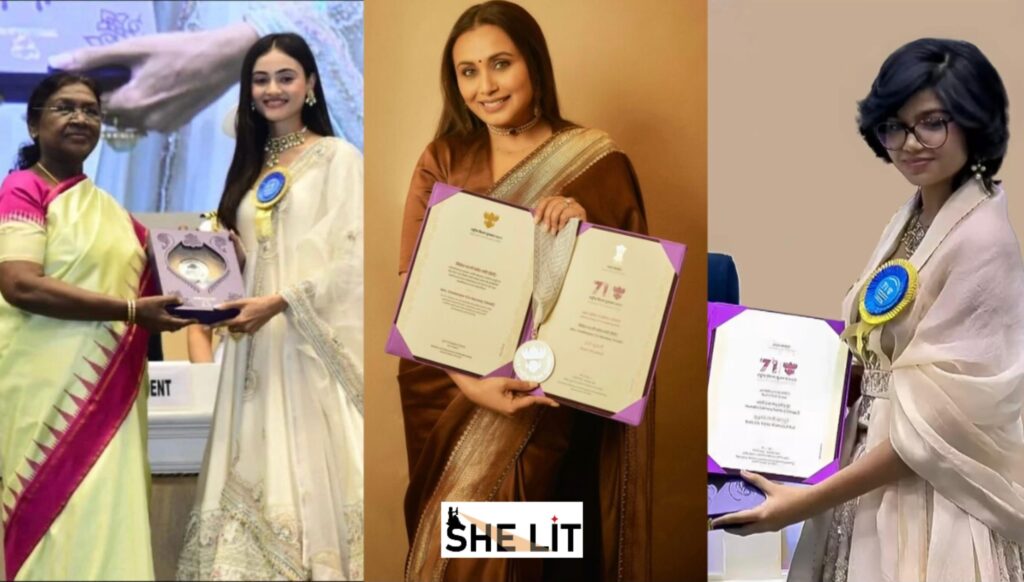The 71st National Film Awards have just concluded, and this year brought a wave of inspiration for women across India. These awards didn’t just recognize cinematic brilliance, they celebrated courage, resilience, and the power of women-led stories.
From seasoned veterans to rising young stars, women across categories shone brightly, proving that Indian cinema is finally giving space to female voices, both in front of and behind the camera.
Rani Mukerji: A Career-Defining Win
After nearly three decades in the industry, Rani Mukerji took home her first National Award for Best Actress for Mrs Chatterjee vs Norway.
The film is based on the true story of an Indian mother who fought against the Norwegian child welfare system to regain custody of her children. Mukerji’s performance was raw, emotional, and unflinchingly real.
In her words:
“This is validation of my 30-year body of work… It was truly surreal to hear about receiving the award. I had my father on my mind the whole day. I felt it was his blessing that it happened in such a fitting way.”
She dedicated her award to her parents and to all mothers across the world, making her win a universal moment of recognition for every woman who has fought for her family.
Sukriti Veni Bandreddi: A Star is Born
At just 15, Sukriti Veni Bandreddi won the National Award for Best Child Artist for her role in Gandhi Tatha Chettu.
Her performance, portraying a young girl who uses Gandhian principles to save a village tree, stood out for its innocence, conviction, and quiet strength.
Her father, acclaimed director Sukumar, said he was “immensely proud” of the dignity and sensitivity Sukriti brought to the character. Her win is a reminder that Indian cinema’s future is bright, and young women are at the forefront of it.
Janki Bodiwala: Regional Cinema Rising
One of the most talked-about highlights this year is Janki Bodiwala’s win for Best Supporting Actress for her work in the Gujarati psychological thriller Vash. The film also won Best Gujarati Feature Film, making it a double triumph for Janki and for Gujarati cinema.
The role: Janki played Arya, a character who is entangled in a terrifying narrative involving black magic and mind control. Her portrayal of fear, psychological conflict, and inner strength stood out.
Her win is pivotal not only for her career but for Gujarati cinema, which is increasingly pushing creative boundaries in genre and narrative. Vash particularly, as a psychological horror film, shows that regional languages and industries can handle complex, daring stories that resonate across India.
Other Trailblazing Women
The 71st National Awards also highlighted women in regional cinema and behind the camera:
- Urvashi won Best Supporting Actress for her powerful performance in Ullozhukku, proving yet again that content-driven roles for women are being recognized beyond the mainstream.
- Yeshoda Prakash, director of Kandeelu – The Ray of Hope, won Best Kannada Feature Film, marking an important milestone for Kodavathi women filmmakers and regional representation.
Why These Wins Matter
Awards are not just trophies; they are cultural signals. This year’s wins highlight a shift in Indian cinema:
- Women’s stories are being told and celebrated, not just as “women-centric” films but as mainstream narratives.
- Long careers are finally getting recognition, proving that women in cinema can have longevity and still deliver career-best performances.
- Young female talent is being nurtured, ensuring that the next generation will inherit a slightly fairer playing field.
Beyond the Red Carpet
While these wins deserve celebration, they also remind us of the work still to be done. Women remain underrepresented behind the camera, and stories from marginalized communities, Dalit, Adivasi, LGBTQ+, and rural women, need more visibility.
But each of these victories chips away at the ceiling and creates space for new voices. As Rani Mukerji said, her award is a tribute to mothers everywhere, but it is also a promise that women’s narratives will no longer be ignored.
SheLit’s Take
At SheLit, we celebrate these wins not just as individual triumphs but as markers of a cultural shift. Indian cinema is slowly becoming more inclusive, more representative, and more willing to embrace women’s truth in all its complexity.

